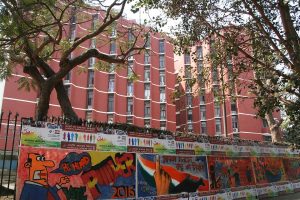The Narendra Modi government’s formation of an eight-member committee headed by former President Ramnath Kovind to examine the prospect of “One Nation, One Election” and recommend measures to that end has created a lot of suspense and apprehensions in India.
The idea behind “One Nation, One Election” is to hold parliamentary and state legislature elections simultaneously, a practice that was discontinued in India in 1967.
Since the government has also, rather suddenly, called a five-day special session of Parliament on September 18-22, there are speculations that the committee may submit its recommendations during that session itself. It would require lightning-fast action for the committee to come up with the recommendations in just two weeks.
Opposition parties have rejected the idea. The only opposition member of the committee, Adhir Ranjan Chowdhury of the Congress, the main opposition party, has declined to be a part of it.
“INDIA, that is Bharat, is a Union of States. The idea of ‘one nation, one election’ is an attack on the Indian Union and all its States,” Congress leader Rahul Gandhi wrote in a tweet the day after the committee was formed.
This is not the first time that Modi’s Bharatiya Janata Party (BJP) has brought up the issue of unifying elections. This is actually the fifth time, though this time they have made matters more formal with the formation of the former president-led committee, which is to start functioning immediately and submit the recommendations “at the earliest.”
In November 2020, Modi called for simultaneous elections at every level — from the parliament and state assemblies to municipalities and panchayats (village self-government). This is what the Kovind-led committee is to explore.
The ruling dispensation argues that it would help reduce election expenses and free the administrative staff of a lot of election-related work, allowing them and politicians to focus more on “development.”
Beyond the declared goals, the BJP leaders are understandably banking on the hope that simultaneous elections would result in a similar voting pattern for all levels, helping the party achieve its desired hegemony.
Critics have argued that such a move, apart from hurting India’s federal structure, would also make voters more susceptible to being taken for granted once the election is over.
“In the current parlous state of our democracy, elections are the only recourse for the Indian public to challenge the overweening power of the government,” Congress parliamentarian Shashi Tharoor wrote.
By bringing up the issue of holding simultaneous elections together at this time, the Modi government could be aiming to defer the assembly elections in the states of Madhya Pradesh, Rajasthan, Chhattisgarh, and Telangana that are to be held by the end of this year. It could postpone the state elections or conduct parliamentary elections ahead of time. The plans of the government may become clearer once the special session of the Parliament takes place.
The move, though, comes as part of the Modi government’s overall approach to centralization of power and uniformity of policies.
Ideas like “One Nation, One Digital Library” to bring together digitized copies of all resources in all important libraries across the country, or the “One Nation, One Subscription” policy for scientific research papers and academic journals may, indeed, be beneficial moves. “One Nation, One Ration Card” has, despite initial glitches, found broader acceptance.
However, concepts like the Uniform Civil Code, “One Nation, One Police Uniform” and “One Nation, One Education” have faced criticism from opposition parties, especially those ruling different states, for being against the ideals of federalism and pluralism. Such policies, critics say, subvert the idea that different approaches are required to address the needs of the country’s population, which is widely diverse in culture, food habits, customs, and languages.
On the other hand, the “One Nation, One Market” policy has been accused of facilitating corporate takeover of the agriculture sector. The “One Nation, One Fertilizer” scheme, for example, “smacks of a deeper attempt to facilitate corporate penetration into Indian agriculture,” in the words of one critic.
Even though the government of India has two official languages, English and Hindi, and the states have their own set of official languages, the Modi government has nearly implemented the “One Nation, One Language” policy. All union government communications to states are written in Hindi, a practice that the southern state of Tamil Nadu vehemently opposed. The government has been repeatedly accused of imposing Hindi, the regional language with the largest number of speakers, on the speakers of other regional languages. But the Modi government had paid little attention to all such opposition.
After the 2019 stripping of Jammu and Kashmir of the special provisions for autonomy it enjoyed since the erstwhile princely state’s merger with India, the union government claimed that “the dream of one nation, one law, one symbol” had been “fulfilled.” This is despite the northeastern states continuing to enjoy certain exemptions – outsiders still can’t buy land or property there.
“One Nation, One Election” is the biggest and most impactful of all these centralization and uniformity policies that the government has proposed so far.
The committee is to assess and propose specific changes to the Constitution, the Representation of the People Act, and other relevant laws and regulations necessary to facilitate the idea. One of the terms and conditions that that the committee will examine is whether the amendments to the Constitution would require ratification by the states.
This has strengthened the perception among India’s opposition parties and independent observers that the Modi government is trying to find a way to bypass the consent of states, many of which are ruled by opposition parties. The terms of reference have already determined the recommendations, the Congress alleged.
How much of these speculations hold true remains to be seen.

































